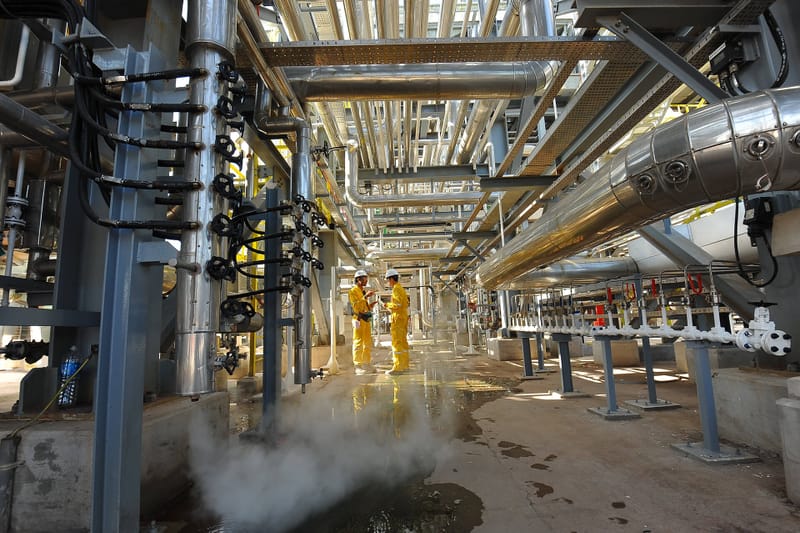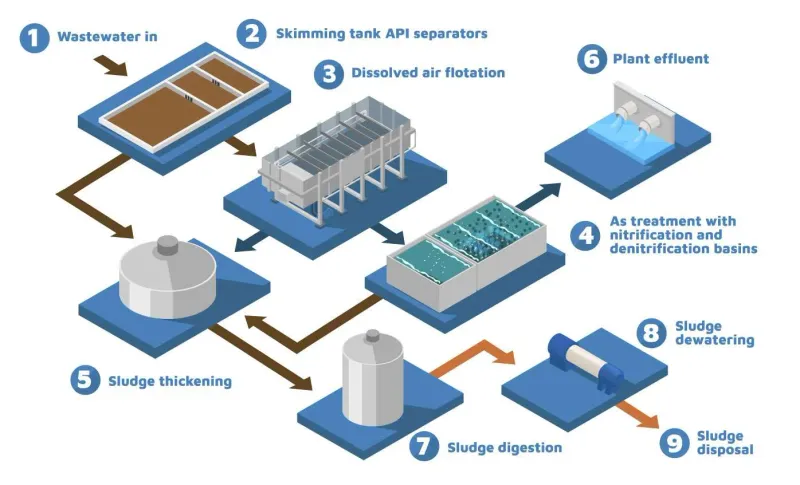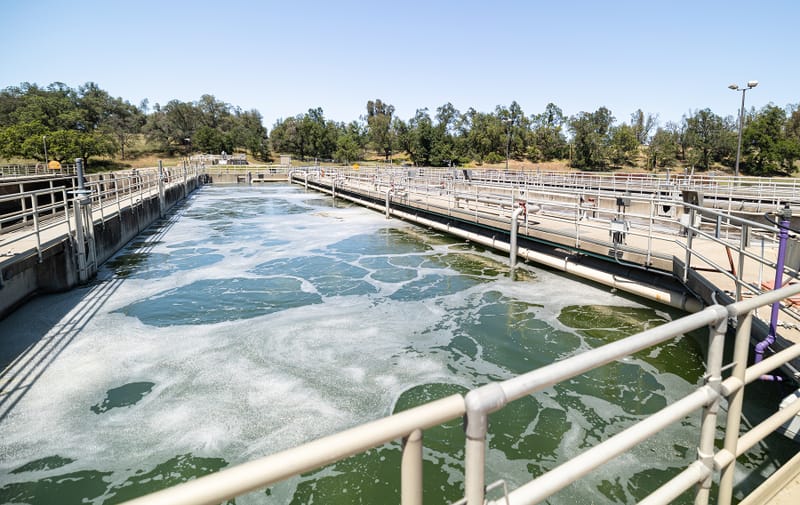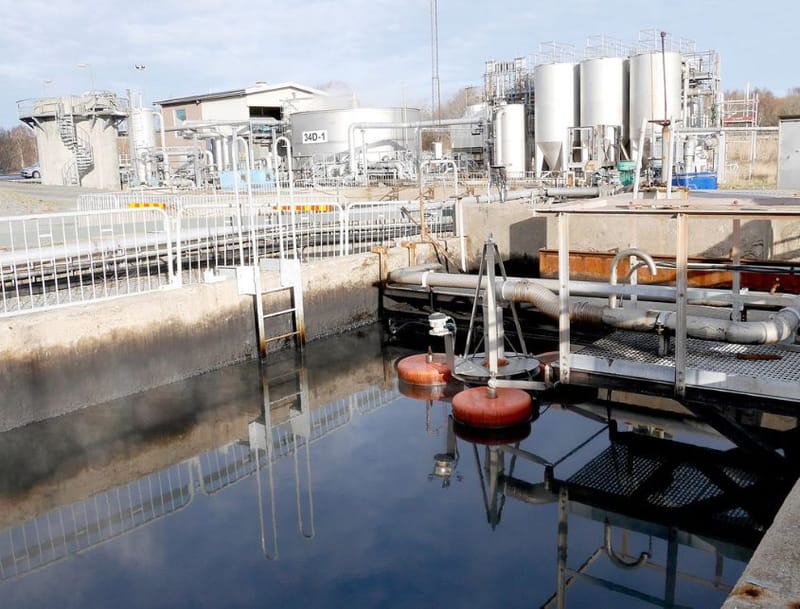Refinery Wastewater Treatment: Paving the Way for Sustainable Operations
Introduction
Refineries play a pivotal role in meeting the world's energy demands, producing essential petroleum products that power industries and drive economies. However, with this regulatory challenges vital function comes the challenge of managing the wastewater generated during the refining process. Refinery wastewater is a complex mixture containing various contaminants, including hydrocarbons, heavy metals, and suspended solids, posing significant environmental and regulatory challenges. In this blog, we delve into the challenges faced by the refining industry in treating wastewater, explore innovative solutions that are revolutionizing refinery wastewater treatment, discuss future actions to further enhance treatment efficiency and sustainability, and conclude with the importance of continuous innovation in ensuring the long-term viability of refinery operations.

Challenges while Treating Refinery WasteWater
Refinery wastewater treatment poses numerous challenges, each demanding innovative solutions for effective management. The primary hurdle lies in the complexity of contaminants present in refinery wastewater. This mixture encompasses a wide array of pollutants, including hydrocarbons, toxic heavy metals, and organic compounds. Each contaminant necessitates specific treatment approaches, compounding the intricacies of the purification process.
Refinery wastewater treatment poses numerous challenges, each demanding innovative solutions for effective management. The primary hurdle lies in the complexity of contaminants present in refinery wastewater. This mixture encompasses a wide array of pollutants, including hydrocarbons, toxic heavy metals, and organic compounds. Each contaminant necessitates specific treatment approaches, compounding the intricacies of the purification process.
Energy intensity further exacerbates the challenges of refinery wastewater treatment. Conventional treatment methods often demand significant energy inputs, driving up operational costs and environmental impacts. Addressing this energy consumption is crucial for achieving financial sustainability and minimizing environmental footprints.
Furthermore, regulatory compliance is paramount for refineries, necessitating adherence to strict environmental regulations governing wastewater discharge. Continuous monitoring and optimization of treatment processes are essential to meet evolving regulatory requirements and prevent adverse environmental impacts.
In summary, refinery wastewater treatment is beset by challenges stemming from the complexity of contaminants, the volume and variability of wastewater, energy-intensive treatment methods, and stringent regulatory compliance. Overcoming these challenges requires innovative approaches that streamline treatreatment processestment processes, minimize resource consumption, and enhance environmental protection while ensuring compliance with regulatory standards.

Solutions
Despite facing significant challenges, the refining industry is actively embracing innovative solutions to enhance wastewater treatment efficiency and sustainability:
Advanced Oxidation Processes (AOPs):
AOPs, such as ozonation and UV/H2O2 oxidation, are emerging as effective solutions for treating refinery wastewater. These processes utilize advanced oxidation reactions to degrade recalcitrant organic compounds, eliminating color and odor from wastewater. AOPs offer a robust approach to tackling complex contaminants, improving overall treatment efficacy and ensuring compliance with regulatory standards.
Electrocoagulation:
Electrocoagulation technology presents a promising alternative to conventional coagulation-flocculation processes. By utilizing electrical currents to destabilize and aggregate suspended particles, oil droplets, and colloids, electrocoagulation offers an energy-efficient method for wastewater treatment. This innovative approach enhances particle removal efficiency, reduces chemical usage, and minimizes sludge generation, contributing to sustainable wastewater management practices in refineries.
Constructed Wetlands:
Mimicking natural ecosystems, constructed wetlands utilize plants, microorganisms, and soil media to treat wastewater effectively. Beyond providing cost-effective treatment solutions, constructed wetlands offer additional benefits such as habitat creation and biodiversity conservation. By harnessing the natural processes of wetland ecosystems, refineries can achieve sustainable treatment outcomes while minimizing environmental impact and promoting ecological resilience.
Anaerobic Digestion for Energy Recovery:
Anaerobic digestion processes offer a dual benefit of wastewater treatment and renewable energy production. By converting organic matter in wastewater into biogas, anaerobic digestion facilitates energy recovery while reducing greenhouse gas emissions. This sustainable approach not only enhances the environmental performance of refineries but also contributes to their energy self-sufficiency and resilience against fluctuating energy costs.
Membrane Technologies:
Advanced membrane filtration techniques, including reverse osmosis and membrane distillation, provide high-efficiency removal of contaminants from refinery wastewater. These membrane-based processes offer superior performance in removing dissolved solids, organic compounds, and pathogens, making them ideal for water reuse and resource recovery applications. By incorporating membrane technologies into their treatment systems, refineries can improve water quality, minimize discharge volumes, and maximize resource utilization, thereby enhancing overall sustainability.

Future Actions
In shaping the future of refinery wastewater treatment, several proactive measures can be implemented:
1. Harnessing Artificial Intelligence and Machine Learning: Integrating AI and ML algorithms can revolutionize treatment processes. These technologies enable predictive modeling, real-time optimization, and anomaly detection, empowering refineries to operate with enhanced efficiency and address treatment challenges proactively. By leveraging AI and ML, refineries can optimize resource allocation, minimize energy consumption, and improve treatment outcomes.
2. Embracing Circular Economy Principles: Refineries can adopt circular economy principles to maximize the value extracted from wastewater streams. By exploring opportunities for resource recovery and valorization of by-products, such as nutrient-rich biosolids for agricultural use or reclaimed water for non-potable applications, refineries can minimize waste generation, reduce environmental impact, and enhance overall sustainability. Embracing circularity fosters a closed-loop approach to resource management, promoting resource efficiency and resilience within the refinery ecosystem.
3. Fostering Collaboration and Knowledge Sharing: Industry collaboration and knowledge-sharing initiatives play a pivotal role in driving innovation and accelerating progress in refinery wastewater treatment. By fostering collaborative partnerships and sharing best practices, technologies, and innovations, refineries can leverage collective expertise to overcome common challenges and identify novel solutions. Collaborative efforts facilitate the exchange of insights, lessons learned, and emerging trends, empowering refineries to stay at the forefront of sustainable wastewater management practices.
In summary, advancing refinery wastewater treatment requires a holistic approach that embraces technological innovation, circular economy principles, and collaborative partnerships. By integrating AI and ML technologies, adopting circular economy principles, and fostering collaboration and knowledge sharing, refineries can drive transformative change, optimize resource utilization, and enhance environmental sustainability. These future actions pave the way for a more resilient and sustainable future in refinery wastewater treatment, ensuring the continued prosperity of both the industry and the environment.

Conclusion
The refining industry is seeing notable strides in resource conservation, operational effectiveness, and environmental stewardship due to innovations in refinery wastewater treatment. Refineries can solve wastewater treatment issues and lead the road towards a more sustainable future by adopting innovative technology, putting sustainable practices into place, and encouraging collaboration and knowledge exchange. Through sustained innovation and development, the refining sector can take the lead in environmentally responsible water management, thereby establishing new benchmarks for operational resilience and environmental excellence.